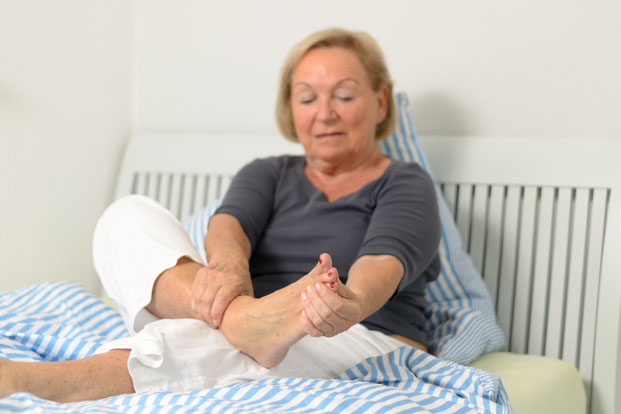It’s a cold winter day. You’ve been out shoveling snow, trying to clear the walkway of the latest blizzardy blast. The shoveling is a workout all in itself. But that’s not what will create the strangest consequence you’d ever expect.
At first, you feel fine. But soon, you notice a tingling sensation in your right leg. You’re sure you didn’t pull a muscle. After all, you work out on a daily basis.
A series of tests reveal an interesting diagnosis. It’s one you’ve never heard of. You’ve got peripheral neuropathy — brought on by extreme cold conditions.
According to the U.S. National Library of Medicine, peripheral neuropathy is a common condition in which the peripheral nerves that relay bodily information don’t work as they should. This can involve damage to just one nerve or nerves throughout the entire body.
While there are many types of peripheral neuropathy (more than 100 to be exact), patients are often educated about this concept through four different areas of neuropathy. This makes it easier for doctors to classify.
The first of these is called motor neuropathy. In this type of neuropathy, nerves that control bodily movement and muscles are affected. According to Johns Hopkins Medicine, this can affect the movement of the hands or speech.
The second type of neuropathy is called sensory neuropathy. This affects the sensory nerves, which dictate sensation (like touch or pain). As a result, some patients may not even feel pain or other bodily sensations.
The third type of neuropathy is autonomic nerve neuropathy. This involves the autonomic nerves, which are in charge of unconscious bodily functions. Examples of this would be breathing or heartbeat. Needless to say, damage to this system is dangerous.
The fourth type of neuropathy is a grouping known as combination neuropathies. This involves a combination of two or three of the aforementioned neuropathies. For example, a patient may have sensory-motor neuropathy.
So just what causes peripheral neuropathy?
The most common reason for peripheral neuropathy is diabetes. That’s because diabetes affects nerve function in general. It is believed that between 60 and 70 percent of those with diabetes have suffered some type of nerve damage as a result of the disease.
According to the National Institute of Neurological Disorders and Stroke, when one suffers from diabetic neuropathy, “nerve damage occurs in an ascending pattern.” This starts with the nerves associated with distant areas of the body in relation to the brain and spinal cord. This is why pain and numbness of the extremities are some of the telltale symptoms of diabetic neuropathy.
Aside from diabetes, other factors can cause peripheral nerve damage. The U.S. National Library of Medicine says that these can include autoimmune disorders (like lupus), kidney disease, HIV (the virus that causes AIDS), liver infections, vitamin deficiencies (such as a lack of vitamin B12), metabolic disease, heavy metal poisoning, inadequate blood flow in the legs, and an underactive thyroid. Broken bones, heavy, prolonged drinking, medications, nerve pressure, cold temperatures and poorly fitting casts can cause nerve damage. And finally, neuropathy can be inherited.
If you do suspect nerve damage, there are a number of tests that doctors may recommend. One method of diagnosis is blood tests. Further, electromyography may be done to monitor muscle activity. In addition, nerve conduction studies may be ordered. These measure the speed of signals running through the nerves. And finally, a nerve biopsy may be conducted. In this test, healthcare professionals examine nerve samples by way of a microscope.
If you are diagnosed with neuropathy, it’s important to know that there is (in most cases) no cure. Nonprescription pain relievers, lidocaine injections and pain patches may be suggested. And in some cases, prescription drugs are used. These can range from medication to regulate heartbeat to antiepileptic medications and even antidepressants. However, in the most urgent of cases, surgeons may attempt to correct the situation.
So how do you know if you’re suffering from this condition? Following are seven symptoms of peripheral neuropathy.
Tingling
Numbness is a symptom of sensory neuropathy and may involve both numbness and tingling in certain areas of the body. This can be particularly concerning when it affects one’s ability to feel pain in general, making it difficult to know when urgent health concerns arise. (For example, it may be difficult to feel a burn from the stove.) This type of neuropathy also can interfere with sleep.
Pain
While we often think of numbness and tingling as the primary symptoms of nerve damage, neuropathy can cause pain. Medical experts say that this can feel like a stabbing or burning sensation. This can be extremely uncomfortable for those affected, making focusing on daily tasks difficult.
Muscular Issues
Nerve damage can make you feel weak. You might feel unsteady and off balance. Coordination may be affected in that it’s difficult to perform normal tasks like writing or buttoning a shirt. Muscles might even cramp or twitch. These issues are telltale signs of motor neuropathy.
Lightheadedness
One of the symptoms of autonomic neuropathy can be dizziness or lightheadedness. This is due to sudden changes in blood pressure. Symptoms like these can be terrifying for a person who does not know just why this is happening.
Diarrhea and Constipation
Autonomic neuropathy can cause intestinal issues like diarrhea, constipation and incontinence. This is a result of nerve injury in the intestines or digestive track.
Skin Changes
Though one would think of dermatological issues like psoriasis when it comes to the skin, neuropathy can play a role. In particular, motor neuropathy can cause changes in the skin, hair and nails.
Irregular Heartbeat
Irregular heartbeat is associated with autonomic neuropathy. Autonomic neuropathy can cause dangerous symptoms. These can include difficulty breathing and irregular heartbeat. It also can interfere with both eating and swallowing. It can even affect the body’s ability to sweat.
So if you’re feeling the burn – or numbness and tingle – it’s important to see a doctor to get to the root of the uncomfortable problem.

Leave a Reply